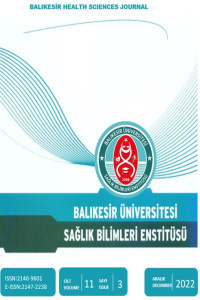Yaşlı Bireylerin Sosyodemografik Özelliklerinin Mobilite Düzeyleri Üzerine Etkisinin İncelenmesi
Amaç: Bu çalışma kognitif düzeyi iyi olan yaşlılarda sosyodemografik özelliklerin mobilite düzeyine etkisini araştırmayı amaçladı. Gereç ve Yöntem: Tanımlayıcı kesitsel tipteki bu araştırma, Denizli ili Merkezefendi ilçesine bağlı 2 aile sağlığı merkezi bölgesinde ikamet eden, bilişsel düzeyi iyi (Hodkinson Mental Test puanı 8 ve üzeri) 521 (ortalama yaş: 71.81±6.29) katılımcı ile yürütüldü. Verilerin toplanmasında Sosyodemografik Form ve Yaşlı Mobilite Skalası (YMS) kullanıldı. Bulgular: Kognitif düzeyi iyi olan yaşlılarda yaş arttıkça mobilite skorunun istatistiksel olarak anlamlı düzeyde azaldığı (p < 0.001), eğitim düzeyi arttıkça mobilite skorunun da arttığı (p < 0.001) tespit edildi. Yaşlı kadınların mobilite skorunun erkeklerden daha az olduğu (p=0.043), evli yaşlı katılımcıların mobilite skorunun bekarlardan daha fazla olduğu (p < 0.001) belirlendi. Beden kütle indeksi, sigara ve alkol tüketiminin mobilite düzeyine etkisi yokken (p ˃ 0.05), düzenli egzersiz alışkanlığı olan yaşlıların mobilite düzeylerinin olmayanlara kıyasla daha yüksek olduğu saptandı (p < 0.001). Düşme hikayesi (p < 0.001) ve günlük alınan ilaç miktarı (p=0.001) fazla olan yaşlıların mobilite skorları daha düşüktü. Sonuç: Kognitif düzeyi iyi olan yaşlılarda; 80 yaş ve üzerinde olmak, kadın ve bekar olmak, düşük eğitim düzeyine sahip olmak ve egzersiz alışkanlığının olmaması mobilite düzeyini olumsuz etkileyen faktörlerdendir.
Anahtar Kelimeler:
Yaşlı, Mobilite kısıtlılığı, Yaşlanma.
Investigation of the Effect of Sociodemographic Characteristics of Elderly Individuals on Mobility Levels
Objective: This study aimed to investigate the effect of sociodemographic characteristics on the level of mobility in the elderly with good cognitive levels. Materials and Methods: This descriptive cross-sectional study was carried out with 521 participants (mean age: 71.81 ± 6.29) over the age of 65 living in 2 Family Health Center regions of Merkezefendi district in Denizli. The sociodemographic information form and the Elderly Mobility Scale (EMS) were used to collect data. Results: In the elderly with good cognitive level, it was determined that the mobility score decreased (p < 0.001) as the age increased, and the mobility score increased as the education level increased (p < 0.001) significantly. It was determined that the mobility score of the female elderly was lower than the male (p=0.043), and the mobility score of the married elderly participants was higher than the singles (p < 0.001). While Body Mass Index smoking and alcohol consumption had no effect on mobility level (p ˃ 0.05), mobility levels of the elderly with regular exercise habits were higher than those without (p < 0,001). The mobility scores of the elderly, who had a high history of falls (p < 0,001) and who had a high daily amount of medication (p=0,001), were lower. Conclussion: Being 80 years of age and above, female gender, single marital status, having low education level, and not having an exercise habit are the factors that negatively affect the mobility levels in elderly.
Keywords:
Elderly, Mobility limitation, Aging.,
___
- 1. Rodrigues, R.A., Scudeller, P.G., Pedrazzi, E.C., Schiavetto, F.V., Lange, C. (2008). Morbidity and interference in seniors’ functional ability. Acta Paul Enferm., 21(4), 643-8. https://doi.org/10.1590/S0103-21002008000400017 2. Cleaver, S., Hunter, D., & Ouellette-Kuntz, H. (2009). Physical mobility limitations in adults with intellectual disabilities: a systematic review. JIDR, 53(2), 93–105. https://doi.org/10.1111/j.1365-2788.2008.01137.x
- 3. Torres-de Araújo, J.R., Tomaz-de Lima, R.R., Ferreira-Bendassolli, I.M., Costa-de Lima, K. (2018). Functional, nutritional and social factors associated with mobility limitations in the elderly: a systematic review. Salud Publica Mex., 60(5), 579-585. https://doi.org/10.21149/9075
- 4. Glisky, E.L. (2007). Changes in cognitive function in human aging, In: Riddle, D.R., (Ed.). Brain Aging Models, Methods, and Mechanisms (136). CRC Press/Taylor & Francis, Boca Raton, FL, USA.
- 5. Tian, Q., An, Y., Resnick, S. M., & Studenski, S. (2017). The relative temporal sequence of decline in mobility and cognition among initially unimpaired older adults: Results from the Baltimore Longitudinal Study of Aging. Age and ageing, 46(3), 445–451. https://doi.org/10.1093/ageing/afw185
- 6. Muir, S. W., Gopaul, K., & Montero Odasso, M. M. (2012). The role of cognitive impairment in fall risk among older adults: a systematic review and meta-analysis. Age and ageing, 41(3), 299–308. https://doi.org/10.1093/ageing/afs012
- ISSN: 2146-9601
- Yayın Aralığı: Yılda 3 Sayı
- Başlangıç: 2012
- Yayıncı: Balıkesir Üniversitesi
Sayıdaki Diğer Makaleler
COVID-19 Pandemisinin Ortodontik Tedavi Gören Hastaların Kaygı Düzeyine Etkisi
Özge ÇELİK GÜLER, Pelin ACAR ULUTAŞ
Fatma Nur DUMAN, Zehra GÖLBAŞI, Ayten ŞENTÜRK ERENEL
H. Sevilay BAHADIR, Elif Ulku DEMİR SERAN
Yaşlı Bireylerin Sosyodemografik Özelliklerinin Mobilite Düzeyleri Üzerine Etkisinin İncelenmesi
Nesrin YAĞCI, Şule ŞİMŞEK, Mücahit ÖZTOP
Hemşirelik Mesleği Temalı Memes/Caps Kültürü: Bir Göstergebilim Çalışması
Huzurevinde Yaşayan Yaşlılarda Kinezyofobi ve İlişkili Faktörlerin Değerlendirilmesi
Fatma Zehra GENÇ, Naile BİLGİLİ
Sağlık Okuryazarlığı İle Sağlık Algısı İlişkisinin İncelenmesi Üzerine Bir Araştırma
Numune Hastanelerinden Şehir Hastanelerine: Türkiye’de Hastanelerin Dünü, Bugünü Ve Yarını
